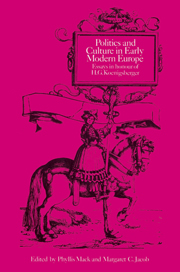Book contents
- Frontmatter
- Contents
- Introduction
- The court of the Spanish Habsburgs: a peculiar institution?
- The magnificent Lorenzo de' Medici: between myth and history
- Political rhetoric and poetic meaning in Renaissance culture: Clément Marot and the Field of Cloth of Gold
- The unlikely Machiavellian: William of Orange and the princely virtues
- The Estates of Brabant to the end of the fifteenth century: the make-up of the assembly
- Presents and pensions: a methodological search and the case study of Count Nils Bielke's prosecution for treason in connection with gratifications from France
- Between Bruni and Machiavelli: history, law and historicism in Poggio Bracciolini
- Constitutional discourse in France, 1527–1549
- Lieuwe van Aitzema: a soured but knowing eye
- John Calvin's contribution to representative government
- Luther and the humanists
- Scholars and ecclesiastical history in the Early Modern period: the influence of Ferdinando Ughelli
- ‘By an Orphean charm’: science and the two cultures in seventeenth-century England
- The crisis of the European mind: Hazard revisited
- Isaac Beeckman and music
- Decadence, shift, cultural changes and the universality of Leonardo da Vinci
- Bibliography of the writings of HELMUT GEORG KOENIGSBERGER
- Index
‘By an Orphean charm’: science and the two cultures in seventeenth-century England
Published online by Cambridge University Press: 20 October 2009
- Frontmatter
- Contents
- Introduction
- The court of the Spanish Habsburgs: a peculiar institution?
- The magnificent Lorenzo de' Medici: between myth and history
- Political rhetoric and poetic meaning in Renaissance culture: Clément Marot and the Field of Cloth of Gold
- The unlikely Machiavellian: William of Orange and the princely virtues
- The Estates of Brabant to the end of the fifteenth century: the make-up of the assembly
- Presents and pensions: a methodological search and the case study of Count Nils Bielke's prosecution for treason in connection with gratifications from France
- Between Bruni and Machiavelli: history, law and historicism in Poggio Bracciolini
- Constitutional discourse in France, 1527–1549
- Lieuwe van Aitzema: a soured but knowing eye
- John Calvin's contribution to representative government
- Luther and the humanists
- Scholars and ecclesiastical history in the Early Modern period: the influence of Ferdinando Ughelli
- ‘By an Orphean charm’: science and the two cultures in seventeenth-century England
- The crisis of the European mind: Hazard revisited
- Isaac Beeckman and music
- Decadence, shift, cultural changes and the universality of Leonardo da Vinci
- Bibliography of the writings of HELMUT GEORG KOENIGSBERGER
- Index
Summary
Recently historians have been tracing the emergence of two cultures, elite and popular, in early modern Europe and have come to some remarkably similar and startling conclusions. The general outlines of the picture they have drawn apply to both England and the Continent. During the sixteenth century three things worked together to make the common people heard, particularly in the cities: the printing press, the Reformation, and the commercial revolution. Printing and the Reformation promoted literacy, and the commercial revolution gave hitherto obscure men (and a few women) access to the press and publication because what they had to say, whether about medicine or mechanics, would sell in a world of increasing literacy, prosperity, and economic opportunity. Finally, the Reformation gave ordinary people a vision, often millenarian in nature, of a better future order here on earth, while doctrines like predestination and the priesthood of all believers imparted a commitment to trying to achieve it.
During the seventeenth century, a dramatic change took place. The elite, having once patronized popular culture, became increasingly suspicious of and hostile to it. The price revolution had produced a widening gap between those who took advantage of it and those, particularly at the bottom of society, who were victimized by it, and this was especially the case during the severe economic decline of the first half of the seventeenth century.
- Type
- Chapter
- Information
- Politics and Culture in Early Modern EuropeEssays in Honour of H. G. Koenigsberger, pp. 231 - 250Publisher: Cambridge University PressPrint publication year: 1987
- 3
- Cited by



